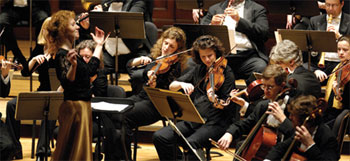by Daniel Hathaway

Most concertgoers would put Beethoven and Schubert in the “greatest of all time category,” but Purcell? Sorrell agrees that his is not a household name, but she’s betting that a program of music the late-17th century composer created to celebrate the joys and soothe the sorrows of the British royal family will increase his fortunes among Clevelanders.
Among those joys will be highlights from King Arthur and Dido and Aeneas, examples of the splendid music Purcell wrote for the London theater earlier in his career. When Purcell’s mentor John Blow resigned as organist of Westminster Abbey in 1679, turning the post over to his pupil, Purcell began writing equally dramatic church music. Apollo’s Fire will include his Ode for the Birthday of Queen Mary (a joy), and the Funeral Music for Queen Mary (a sorrow) on the four programs the orchestra and Apollo’s Singers will present from October 6-9.
“People will be stunned at how beautiful and moving this music is,” Sorrell said. “We have wonderful soloists in addition to the chorus.” Those will include sopranos Molly Netter and Molly Quinn, mezzo-soprano Amanda Powell, countertenor Eric Brenner, tenor Karim Sulayman, and baritone Jeffrey Strauss.
At the other end of its anniversary year, from April 27-30 Apollo’s Fire will perform Beethoven’s Symphony No. 5 and his Violin Concerto with soloist Noah Bendix-Balgley in a program called “Beethoven the Revolutionary.” Sorrell notes that pushing the limits by playing this familiar repertoire on period instruments will be something of a revelation. “The sense of his revolutionary struggle takes on new meaning. People will hear the fifth symphony as they’ve never heard it before.” The festival will also include chamber music by Franz Schubert.
In the middle of its season, Apollo’s Fire will offer programs entitled “Love in Venice” (November 17-20), performances of Handel’s Messiah (December 9-12 and 16), “Virtuoso Bach,” a set of concerts featuring Baroque oboist Debra Nagy (February 16-20), and “Sacred Bach,” a cycle of J.S. Bach’s church cantatas and a Mass under the direction of Julian Wachner, who directs the music at Trinity Church, Wall Street, in New York (March 23-26).
“The Venice program started out as a sequel to my ‘Blues Café 1610’ program,” Sorrell noted, “but the idea morphed as things got stranger during the presidential election campaign. I decided to angle it in the direction of a multicultural concert featuring the joys of a diverse society. The program looks at Venice as a place where Venetians, Arab traders, Spanish merchants, and German tourists are all mingling together. There’ll be Sephardic songs, Monteverdi love songs and duets, and plenty of lively Vivaldi concertos, including ‘Autumn’ from The Four Seasons.”
Sorrell and Apollo’s Fire have performed Handel’s Messiah a number of times over the last two and a half decades and have recorded the work. How has her approach changed over the years? “My ideas have deepened, and I’ve become a bit bolder with them in terms of really telling the story with the music. It’s gotten a bit more theatrical.”
Although Sorrell and the orchestra have performed J.S. Bach’s rarely-heard d-minor oboe concerto, it’s been in the form of his transcription for harpsichord solo and strings. “Debra Nagy is such a beautiful player. There’s no one I’d rather perform it with. She’s really the goddess of the Baroque oboe.”
In turning over the direction of the Bach cantata program to Julian Wachner, Sorrell is acknowledging his great command of that repertoire. “He knows it thoroughly, having performed cantatas on a weekly basis at Trinity Church.”
In looking back over the past 25 years, Jeannette Sorrell notes a number of milestones that she and the organization have celebrated since its founding: the day in 1995 that she traveled to Akron to look for a venue that sparked the idea of scheduling multiple performances of the same program around the region; the orchestra’s appearance at the 2006 Aspen Festival that heralded its arrival as a national touring ensemble; Apollo’s Fire’s European debut at Wigmore Hall four years later; and the Countryside Concerts that fulfilled her dream of performing in rustic settings during the summer.
Looking forward, Sorrell eagerly anticipates Apollo’s Fire’s Carnegie Hall debut in March of 2018, a subsequent tour to South America, and a return to Europe. She also points out that the CD of Bach’s St. John Passion is due for release this spring. “We were so happy with that project last year, so the release will be a major event. We set out to make our own statement on the piece, one that can be compared with recordings by John Eliot Gardiner and other European ensembles.”
Sorrell also dreams of making Cleveland a center for Baroque opera one day. “It’s much more affordable than staging Verdi — not half as expensive even at the highest level.” Among other details, that would require a kind of performance space that doesn’t currently exist. It’s a vision, but so was Apollo’s Fire 25 years ago. “That’s what they said to me in 1992 when I proposed creating a Baroque orchestra here: ‘it’s a nice dream, Jeannette.’”
Asked how her dream came to fruition here in Cleveland, Jeannette Sorrell said “it’s partly because of our wonderful staff, but it also speaks to the sophistication of our audience. We have the third largest early music audience in the country after Boston and San Francisco — which are much larger cities and more affluent. The fact that Cleveland has nurtured a period instrument orchestra when New York and Chicago have not is remarkable. We’re very fortunate to be in Cleveland.”
Published on ClevelandClassical.com October 4, 2016.
Click here for a printable copy of this article



